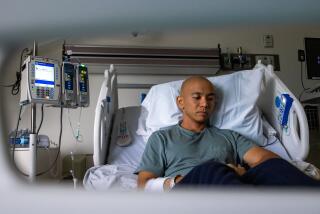Opinion: Who should and shouldn’t get heart transplants -- and why?
When a Georgia teenager named Anthony Stokes got himself killed not long ago, smashing up a stolen car in a police chase after supposedly taking a shot at an old lady in her house, the regret that poured out online was not for the death of the 17-year-old, but for the “waste” of the transplanted heart that Anthony had received not quite two years before.
In 2013, Anthony was 15, with a heart condition that gave him less than a year to live, when the heart transplant program at Children’s Healthcare of Atlanta turned him down because of a “history of noncompliance,” judging him unlikely to follow a strict post-transplant medical regimen. It was that, not the court-ordered ankle monitor he had to wear after getting into several fights, that kept Anthony off the list, the hospital insisted.
But a public lobbying effort was led by his mother, who said her son was being stereotyped as a troublemaker, “and that’s not true.” She was joined by the president of a local chapter of the Southern Christian Leadership Conference, Samuel Mosteller, who said the transplant committee had cited truancy, juvenile offenses and poverty (most transplants are not covered by insurance and post-transplant meds can cost many thousands of dollars) as among the reasons it turned him down.
The hospital relented and put Anthony on the transplant list, and he soon had a new heart. It’s “so I can live a second chance,” he told Atlanta TV station WSB, to “do things I want to do.”
Well, the second chance didn’t last long and based on the selfies he posted online, the “things” included smoking, stuffing his mouth with a wad of cash and posing for selfies with a gun.
Comedian Alonzo Bodden, who donated a kidney to his brother, told me he’s not knowledgeable enough about heart donation rules to make a call in Anthony’s case, but “noncompliance” seems like an important criterion. In hindsight, Anthony “may not have been the best choice, but there was no way of knowing he wouldn’t clean up his act.” The sad thing, Bodden added drily, is that “right now, the way police are killing young blacks, I’m sure there will be an innocent black donor to offset this situation.”
It’s natural to wonder whether the hospital was right the first time. Was it in fact a “waste” of a donated heart, to use the word so many online posters used?
Maybe this was another instance of politics bigfooting science. That’s ordinarily happening with climate change and evolution denial, and with legislatures interfering with abortion-related medical decisions for pregnant women. Did public lobbying trump science to pressure the hospital into making Anthony eligible for a new heart? Or did it, instead, point out shortcomings in the hospital’s criteria?
Baseball legend Mickey Mantle controversially got a new liver in spite of his hard drinking and aggressive liver cancer. And some taxpayers were furious after a California prison inmate got a $1-million-plus heart transplant in 2002, and died within a year.
The man I sought out on this spoke up when Anthony was first turned down for a new heart. Arthur Caplan is the founding director of the division of medical ethics at NYU Langone Medical Center.
“Just because a teenager has had a brush with the law and wears an ankle bracelet doesn’t mean we shouldn’t list him,” Caplan had said when Anthony was rejected.
This week, after Anthony’s death, Caplan told me: “Teenagers are notoriously difficult when it comes to transplants. They don’t like to take drugs, the drugs often make them look puffy or fat and they don’t like that. They don’t like taking orders and don’t like being sick all the time in a way people know about. If you were going to be really tough about it, you wouldn’t transplant teenagers as a class, because they do worse -- they just don’t comply as well. It isn’t just a poor black teenager -- it’s any teenager.”
Anthony’s juvenile lawbreaking, Caplan believes, played a role in the hospital’s original decision. “I thought that wasn’t the right thing to do. I still don’t think [rejecting Anthony initially] was the right thing to do, even though he had this horrible ending.”
Some patients -- not just transplant patients – “go on to things that are not good. Plenty of people come in [to the hospital] who are shot in gang wars, and we send them out and they shoot another guy. People who come in here after driving too fast go back out and still drive too fast. Medicine and doctors should not try to sort out saints and sinners. If we start letting in who’s worthy enough or good enough, you save a lot of money on healthcare because the only people in the hospital will be a couple of nuns and some Mormon elders.”
Caplan is now concerned about what I called a “Stokes effect” -- factors with little or no medical significance influencing transplant decisions. “People say they don’t want prisoners or drug addicts or people who get domestic violence [getting transplants] -- that’s a political issue, not a medical issue. You need to go to your legislature.
“The transplant world is very complex,” he said. “I feel horrible that Anthony Stokes hurt people and his life ended the way it did, but not every [transplant patient] is going to end that way.”
Twitter: @pattmlatimes
More to Read
A cure for the common opinion
Get thought-provoking perspectives with our weekly newsletter.
You may occasionally receive promotional content from the Los Angeles Times.







